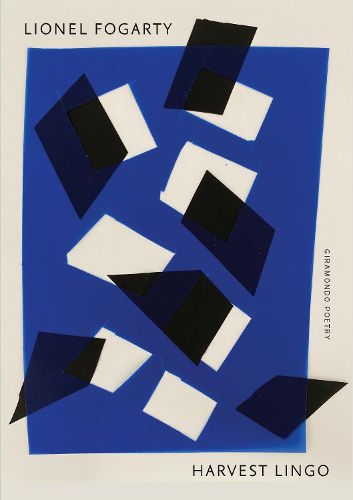Readings Newsletter
Become a Readings Member to make your shopping experience even easier.
Sign in or sign up for free!
You’re not far away from qualifying for FREE standard shipping within Australia
You’ve qualified for FREE standard shipping within Australia
The cart is loading…






Harvest Lingo is the fourteenth collection of poems by Lionel Fogarty, a Murri man with traditional connections to the Yugambeh people from south of Brisbane and the Kudjela people of north Queensland. He is a leading Indigenous rights activist, and one of Australia’s foremost poets, and this collection displays all of the urgency, energy and linguistic audacity for which Fogarty is known.
At the centre of the collection is a series of poems written in India. Deeply empathetic, these poems are remarkable for the connections they draw between the social problems the poet encounters in this country - poverty, class division, corruption - and those he sees in contemporary Australia, besetting his own people.
Other poems tell of encounters between people and between cultures, address historical and cultural issues and political events, and pay tribute to important Indigenous figures. There are intensely felt lyrics of personal experience, and poems which contemplate Fogarty’s own position as a poet and an activist, speaking with and for his community.
Fogarty’s poems are bold and fierce, at times challenging and confronting, moved by strong rhythms and a remarkable freedom with language. They are an expression of the ‘harvest lingo’ which gives the collection its title.
$9.00 standard shipping within Australia
FREE standard shipping within Australia for orders over $100.00
Express & International shipping calculated at checkout
Harvest Lingo is the fourteenth collection of poems by Lionel Fogarty, a Murri man with traditional connections to the Yugambeh people from south of Brisbane and the Kudjela people of north Queensland. He is a leading Indigenous rights activist, and one of Australia’s foremost poets, and this collection displays all of the urgency, energy and linguistic audacity for which Fogarty is known.
At the centre of the collection is a series of poems written in India. Deeply empathetic, these poems are remarkable for the connections they draw between the social problems the poet encounters in this country - poverty, class division, corruption - and those he sees in contemporary Australia, besetting his own people.
Other poems tell of encounters between people and between cultures, address historical and cultural issues and political events, and pay tribute to important Indigenous figures. There are intensely felt lyrics of personal experience, and poems which contemplate Fogarty’s own position as a poet and an activist, speaking with and for his community.
Fogarty’s poems are bold and fierce, at times challenging and confronting, moved by strong rhythms and a remarkable freedom with language. They are an expression of the ‘harvest lingo’ which gives the collection its title.
I first read Lionel Fogarty’s poetry when I was at uni and I was stunned. Although I had loved poetry for a long time, I was more familiar with modern poets than with contemporary Australian and First Nations poets. I felt that I had been shown not only the full scope of possibilities with the poetic form, but with language as a whole. I was therefore excited to hear Fogarty’s 14th collection, Harvest Lingo, will be released this month.
Harvest Lingo addresses many cultural issues and political events, and often focuses on Fogarty’s own perception of being an activist and a poet. One section of the book comprises poems written while he was in India – comparing and contrasting the experiences of different groups of oppressed people. To this effect, I was impressed by the long poem ‘Aloha for Aotearoa’, which calls for solidarity between Māori and Murri peoples.
Fogarty’s use of language is unique, seeming at first to be a cluster of images, but is on further reading a highly considered grammar of its own kind, twisting and reinventing how English can work. This is integral to understanding the collection’s themes through the voice of a Murri man – the language decentres the white Australian reader, instead asking for close re-reading. The line ‘can’t speak their harvest lingo’ captures this well, suggesting that language itself is a process of gathering, tearing down and finding what is useful, but ultimately owned by colonisers and judged by appearances.
‘To be Aboriginal is resurgent forever’, Fogarty says and I see this in his use of language. For readers unfamiliar with Fogarty, I recommend starting with Eelahroo (Long Ago) Nyah (Looking) Möbö-Möbö (Future) published by Vagabond Press. For those who don’t read poetry often, Harvest Lingo is more demanding reading, but those who have enjoyed other First Nations poets such as Evelyn Araluen and Tony Birch will be pleased.
See what the Readings’ team have to say on the blog, discover related events and podcast episodes.
Read beloved and emerging Australian poets like Judith Bishop, Jazz Money and Nam Le.
Delve into fiction, poetry and nonfiction from incredible First Nations Australians.
To acknowledge the long history of storytelling from the oldest continuing living culture in the world, we have compiled a list of 20 great reads by First Nations writers published in 2022! The following books are displayed in no particular order and include fiction, biography, poetry, history and more. Please note that as ever, this is not a complete list of every such read published this year. We also recommend exporing our ongoing collection.
If you're looking for books for younger readers: read our recent 2022 picture book round-up or take a look at our ongoing children's collection or our ongoing young adult collection.